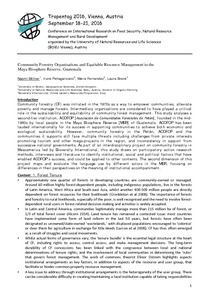The Chinyanja triangle in the Zambezi River Basin, southern Africa: status of, and prospects for, agriculture, natural resources management and rural development
The Chinyanja Triangle (CT) is an area inside the Zambezi
River Basin, inhabited by Chinyanja-speaking people
sharing a similar history, language and culture across
the dryland systems of the eastern province of Zambia,
southern and central regions of Malawi and Tete Province
of Mozambique. Chiefs and Chiefdoms play a critical role
in decision making and influencing social relationships. The
Zambezi River, which originates in the Kalene Hills in Zambia
is joined by ten big tributaries from six countries, and is



